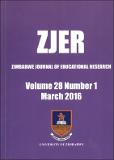| dc.contributor.author | Bolu-Steve, F.N. | |
| dc.contributor.author | Ogungbade, O.K. | |
| dc.coverage.spatial | Nigeria. | en |
| dc.date.accessioned | 2016-06-08T14:13:50Z | |
| dc.date.available | 2016-06-08T14:13:50Z | |
| dc.date.issued | 2016-03 | |
| dc.identifier.citation | Bolu-Steve, F. N. and Ogungbade, O.K. (2016) Factors that determine use of the counselling centre by students of a Nigerian institution of higher learning, Zimbabwe Journal of Educational Research, vol. 28, no.1, pp. 104-122. Harare: HRRC. | en |
| dc.identifier.issn | 1013-3445 | |
| dc.identifier.uri | https://opendocs.ids.ac.uk/opendocs/handle/20.500.12413/11649 | |
| dc.description | A ZJER paper on counseling services for students at an Institution of Higher Learning in Nigeria. | en |
| dc.description.abstract | Students of tertiary institutions are faced with diverse challenges and these range from academic to socio-economic ones. A trained counsellor should he well-equipped to help students deal with their challenges. The study investigated the factors that determine use of the Counselling Centre by students of University of Ilorin, Kwara State, Nigeria. The sample comprised undergraduate and postgraduate students of the University. The purposively sampling technique was used in selecting four largefaculties in the University. In each of these facilities, simple random sampling technique was used in selecting one hundred students, making a total of four hundred respondents. Data were collected using a researcher designed instrument tagged 'Factors for Counselling Centre Use Questionnaire (FCCUQ)'. The questionnaire was pilot tested, validated and the reliability co-efficient of 0.78 obtained revealed that the instrument was reliable for the study. The major finding of the study revealed that “vocational needs ” is the highest factor that determines the use of the Counselling Centre by respondents. Also, thefindings of the study revealed that faculty, religion and course of study of the respondents significantly influenced the factors that determine the use of the Counselling Centre. However, no significant difference was found on the basis of gender. Based on the findings of the study, it was therefore recommended that the NUC should encourage universities to set up guidance and counselling programmes in their institutions. | en |
| dc.language.iso | en | en |
| dc.publisher | Human Resource Research Centre (HRRC), University of Zimbabwe (UZ) | en |
| dc.rights.uri | http://creativecommons.org/licenses/by-nc-nd/3.0/ | en |
| dc.subject | Education | en |
| dc.title | Factors that determine use of the counselling centre by students of a Nigerian institution of higher learning | en |
| dc.type | Article | en |
| dc.rights.holder | University of Zimbabwe (UZ), Human Resources Research Centre (HRRC) | en |


